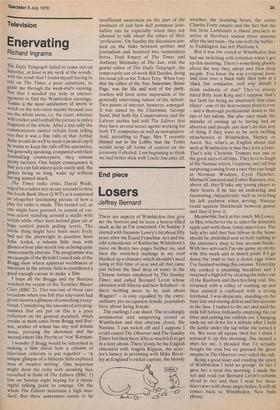Television
Enervating
Richard Ingrams
The Daily Telegraph failed to come out on Saturday, at least in my neck of the woods, With the result that I found myself having to rely on The Times a poor substitute, to guide me through the week-end's viewing. Not that I needed any help or encouragement to find the Wimbledon coverage. Tennis is the most satisfactory of sports to watch on the television mainly because you see the whole arena, i.e. the court, whereas With cricket and football the picture is only a fragment of the whole. After a fine rally the Commentators cannot refrain from telling You that it was a fine rally or that Arthur Ashe would do well to wear a peaked cap if he wants to keep the rain off his spectacles, but generally speaking, compared with their footballing counterparts, they remain Pretty taciturn. One happy consequence is that you can fall asleep quite easily and, the games being so long, wake up without having missed much.
The Times radio critic, David Wade, urged his readers not on any account to miss the South Bank Show (LWT) as it contained an altogether fascinating picture of how a Play for radio is made. This turned out, as one might have guessed, to consist of various actors standing around a studio with scripts while other men behind glass sat at huge control panels pulling levers. The Whole thing might have been more lively had not the playwright in question been John Arden, a solemn little man with glasses whose play struck one as being quite unnecessarily obscure. The programme was an example of the British Council side of the Bragg show where apparent worthiness of intention in the artistic field is considered a good enough excuse to make a film.
I hope all the Braggs and the Burtons watched the repeat of the Tortelier Master Class (BBC 2). This was one of those rare occasions when you felt that television had given viewers a glimpse of something exceptional. Considering the amount of arts programmes that are put on this is a poor reflection on the general standard, which results in most cases from Bragg and Burton, neither of whom has any real artistic sense, pursuing the showmen and the second-raters like Previn or 'von' Karaj an.
I wonder if Bragg would be interested in making a film about how a column of television criticism is put together — 'A unique glimpse of a hitherto little explored area of creative writing'. One sequence might show the critic with scowling face crouched in front of The Editors (BBC 1) late on Sunday night hoping for a meaningful talking point to emerge. On the whole The Editors maintains a high standard. But there sometimes seems to be insufficient awareness on the part of the producer of just how dull pompous journalists can be especially when they are allowed to talk about the ethics of their 'profession'. On Sunday the discussion centred on the links between politics and journalism and featured two tremendous bores, Fred Emery of The Times and Anthony Shrimsley of The Sun, with the genial editor of The Daily Telegraph, the temporarily out-of-work Bill Deedes, doing his usual job as the Token Tory. When I say that the editor of the New Statesman, Bruce Page, was the life and soul of the party, readers will form some impression of the generally enervating nature of the debate. Two points of interest, however, emerged. It was stated by the Chairman, George Scott, that both the Conservatives and the Labour parties had told The Editors that they have several secret agents working for both TV companies as well as newspapers. And, according to Page, Mrs T recently blurted out to the Lobby that the Tories would scrap all forms of control on the economy if elected. I am beginning to think we had better stick with Uncle Jim after all.


































 Previous page
Previous page